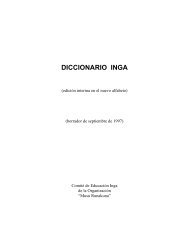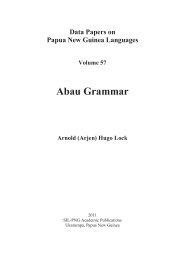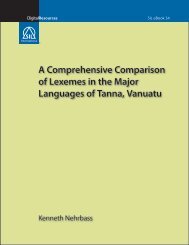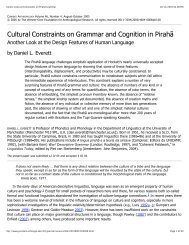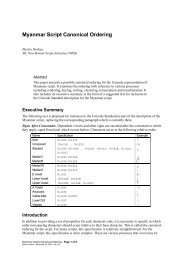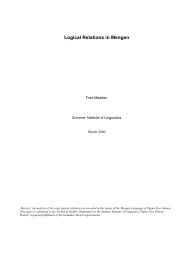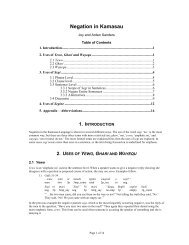The code model of communication: a powerful - SIL International
The code model of communication: a powerful - SIL International
The code model of communication: a powerful - SIL International
Create successful ePaper yourself
Turn your PDF publications into a flip-book with our unique Google optimized e-Paper software.
2. Model as Metaphor 11<br />
other words, the community may have certain “trained incapacities.” 10 As will be<br />
discussed in chapter 4, such an evaluation is not a simple matter. Each community<br />
defines its own set <strong>of</strong> problems, and therefore its own criteria for productivity and for<br />
evaluating that productivity (see Kuhn 1996:94).<br />
<strong>The</strong> question <strong>of</strong> productivity in <strong>model</strong>s is related to their quality <strong>of</strong> reduction. Models<br />
involve generalizations, and generalizations are necessarily reductive. Lak<strong>of</strong>f and<br />
Johnson point out that metaphorical structuring is always partial, not total. “If it were<br />
total, one concept would actually be the other, not merely be understood in terms <strong>of</strong> it”<br />
(Lak<strong>of</strong>f and Johnson 1980:12–13). Indeed, metaphors may even be in conflict with one<br />
another, even though they are used to speak <strong>of</strong> the same phenomenon (Lak<strong>of</strong>f 1987:305;<br />
Lak<strong>of</strong>f and Johnson 1999). Even a brief study <strong>of</strong> metaphor illustrates that contrasting<br />
metaphors will highlight different aspects <strong>of</strong> the phenomena to which they are applied.<br />
Accordingly, individual metaphors will support different reductive strategies for the<br />
problems to which they are applied. This limitation is not necessarily problematic, but it<br />
quickly becomes so in the context <strong>of</strong> reification. Lak<strong>of</strong>f provides a convenient example:<br />
As Gentner and Gentner (1982) observe, there are two prevalent ways <strong>of</strong> metaphorically<br />
understanding electricity: as a fluid and as a crowd made up <strong>of</strong> individual electrons. Both<br />
conceptualizations are needed. Those who understand electricity only as a fluid tend to make<br />
systematic errors in certain kinds <strong>of</strong> problems—those where the crowd metaphor works better.<br />
Students who understand electricity only as a crowd <strong>of</strong> electrons tend to make mistakes on a<br />
different set <strong>of</strong> problems—those where the fluid metaphor works better. Understanding<br />
electricity, at a certain level <strong>of</strong> sophistication, requires metaphors—more than one. Knowing<br />
how to solve problems in electrical circuitry involves knowing which metaphor to use in<br />
which situation. (Lak<strong>of</strong>f 1987:305)<br />
As a function <strong>of</strong> its reductive quality, Lak<strong>of</strong>f and Johnson note that metaphor may<br />
have a constraining effect on comprehension and experience, and subsequently behavior:<br />
<strong>The</strong> very systematicity that allows us to comprehend one aspect <strong>of</strong> a concept in terms <strong>of</strong><br />
another (e.g., comprehending an aspect <strong>of</strong> arguing in terms <strong>of</strong> battle) will necessarily hide<br />
other aspects <strong>of</strong> the concept. In allowing us to focus on one aspect <strong>of</strong> a concept (e.g., the<br />
battling aspects <strong>of</strong> arguing), a metaphorical concept can keep us from focusing on other<br />
aspects <strong>of</strong> the concept that are inconsistent with that metaphor. For example, in the midst <strong>of</strong> a<br />
heated argument, when we are intent on attacking our opponent’s position and defending our<br />
own, we may lose sight <strong>of</strong> the cooperative aspects <strong>of</strong> arguing. Someone who is arguing with<br />
you can be viewed as giving you his time, a valuable commodity, in an effort at mutual<br />
understanding. But when we are preoccupied with the battle aspects, we <strong>of</strong>ten lose sight <strong>of</strong> the<br />
cooperative aspects. (Lak<strong>of</strong>f and Johnson 1980:10)<br />
Building upon the general argument <strong>of</strong>fered by Lak<strong>of</strong>f and Johnson, Ronald<br />
Langacker also comments upon the significance <strong>of</strong> metaphor in shaping linguists’<br />
expectations:<br />
10 <strong>The</strong> phrase “trained incapacities” has been attributed to both Veblen (see Burke 1984:91) and Paul Feyerabend<br />
(Victor Vitanza 1995, personal <strong>communication</strong>), as well as to Stephen Rosen, a theoretical physicist, “head <strong>of</strong> a<br />
project to study why some scientists’ careers founder” (Goleman 1998:52). Goleman provides no bibliographic entry<br />
for Rosen.



